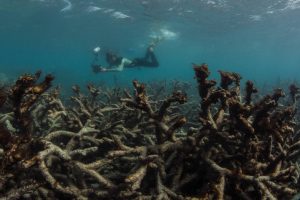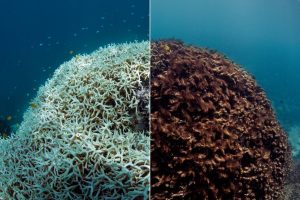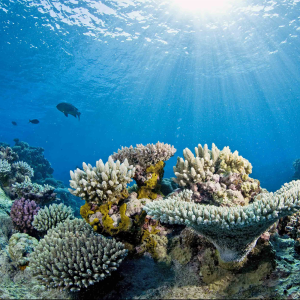In the summer of 2016, it is difficult to find optimism in the field of environmental science.
Yet last month, I gathered with a throng of 2,500 coral reef scientists for the International Coral Reef Symposium (ICRS) in Honolulu. Knowing the extent of the tragic coral bleaching and death that has unfolded on coral reefs this year, I expected a week of doom and gloom. But, to my surprise, the conference gave me more cause for hope than for pessimism.

This is not because the situation facing coral reefs is any better than I’d thought – if anything, it’s worse. Rising greenhouse gas concentrations, warming waters, and stagnant politics have put the biodiversity of coral reefs, along with many other ecosystems, into a sharp decline. On the Great Barrier Reef – a vibrant ecosystem so structurally significant that, unlike the Great Wall of China, it can be seen from space – nearly 25% of coral is dead, from this year’s bleaching alone. At one panel at ICRS, researchers shared photographs and time-lapse footage of coral bleaching and subsequent death around the world. As they flicked through photo after photo, the conference hall adopted the atmosphere of a funeral.
No, things are not looking good for coral reefs, or for many other ecosystems struggling to keep up with the whirlwind of environmental change that stems from human overpopulation, consumption, and industrialization. One scientist, Peter Sale, called coral reefs a “canary” in the proverbial coal mine that is our changing earth. “There are a whole bunch of canaries that are at risk,” Dr. Sale said. “And when the canaries go, our civilization goes.”

So the crux of the problem for coral reefs is the same big, challenging problem facing the entire globe. The main statement of the closing panel at ICRS was that local conservation, such as reducing pollution and improving fisheries, is essential for coral reef health – but will not be enough to save coral reefs unless climate change is also stopped.
Turning the tide on climate change will require a massive effort. A few scientists compared the challenge to World War II. The American war effort consumed about half of our economy; it will take a comparable effort to redirect our economy and society towards addressing climate change. The analogy is a dark one, but I found it surprisingly encouraging. The second world war shaped an entire generation. It demanded immense sacrifice. But fighting, and “winning” (to the extent to which anyone can “win” in war), was possible. The comparison, to me, evokes both the realistic enormity of effort required, and the real possibility of success.
My biggest frustration with a lot of academic research, including my own, is that it is often more centered on problems than their solutions, more focused on whether and how and less on what we can do about it. All these questions are important, but personally I am eager for solution-focused science. I’m still not sure how I will build this into my future, but ICRS gave me a lot of inspiration. The conference actively tried to focus on success stories and sources of hope. I listened to talks about cross-disciplinary research and linking science to policy. I began to see the ways it’s possible to build a career working for environmental solutions – either in a research setting or in the nearby fields of conservation, management, and entrepreneurship.

I also started to think more about my current research as part of this movement. At the conference, I listened to a presentation by a scientist from The Nature Conservancy, who has studied groundwater-borne pollution in Puako, Hawaii, a coastal area near the town where I grew up. Her research documented how raw sewage from coastal homes reaches the ocean (yikes, I know), harming the coral reef and posing a human health hazard. After seeing the project’s data, the Puako community decided to invest in a sewage treatment facility. The project directly relates to my research this summer, in which I’m studying groundwater discharge on coral reefs in Bermuda. The presentation gave me new ideas about how I could collect water samples, and made me think more about the potential health implications of groundwater in Bermuda, which I hadn’t focused on before. Most of all, it allowed me to see a similar project being applied to alleviate a proven problem.
Just as this solutions-oriented science inspired the Puako community to enact change, ICRS inspired me to change some of my personal choices, too. I learned that oxybenzone, an active ingredients in many (though not all!) sunscreens, is highly damaging to corals. As an easily-fried person with a summer of sunny fieldwork ahead of me, I’m nervous about this – but I’ve sworn off sunscreens with oxybenzone. While I’m at it, I’m also staying away from meat and wild-caught fish. And paper towels, too. The difference this makes in the world is, I know, immeasurably tiny. But I suppose I’m doing what I can, in a kind of World War II mentality: the sense that tiny, habitual choices, like every Victory Garden vegetable, are part of a critically important collective effort.
So I’m enlisting. Climate change poses enormous risks to both natural and human systems globally, and turning the tide will take everything we have. Yet whether we will ultimately win or fall short, I want to be on the front lines. I hope I will eventually build a career around science-based solutions to environmental issues. But for now, I’m starting with one small, beautiful reef; one research project. And some coral-safe sunscreen.
– Zoe Sims, Natural Sciences Correspondent

